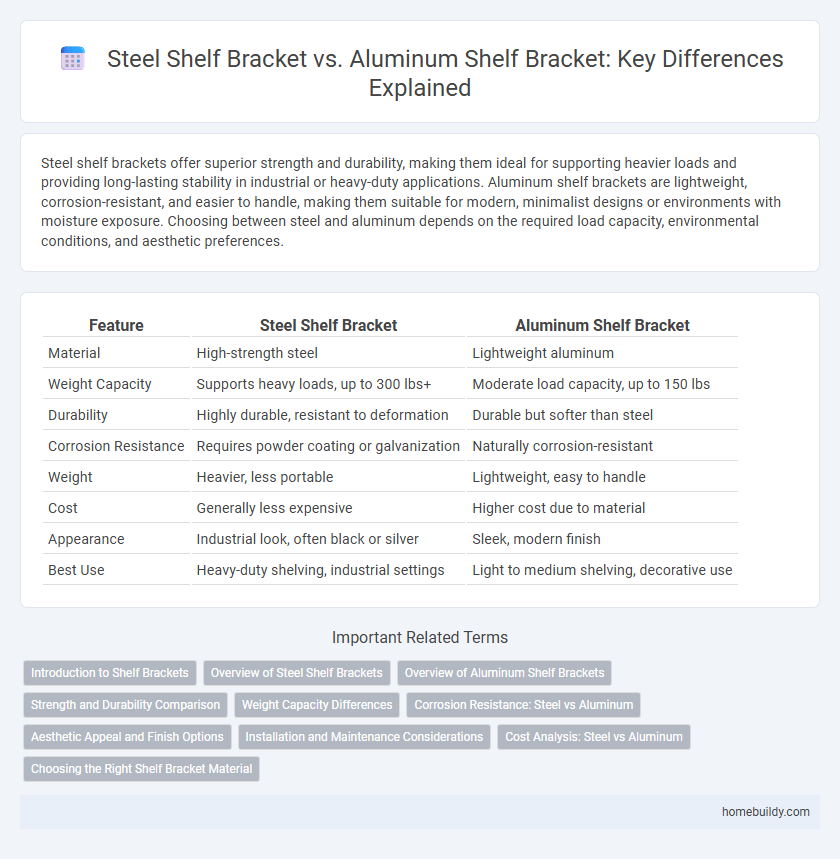Steel shelf brackets offer superior strength and durability, making them ideal for supporting heavier loads and providing long-lasting stability in industrial or heavy-duty applications. Aluminum shelf brackets are lightweight, corrosion-resistant, and easier to handle, making them suitable for modern, minimalist designs or environments with moisture exposure. Choosing between steel and aluminum depends on the required load capacity, environmental conditions, and aesthetic preferences.
Table of Comparison
| Feature | Steel Shelf Bracket | Aluminum Shelf Bracket |
|---|---|---|
| Material | High-strength steel | Lightweight aluminum |
| Weight Capacity | Supports heavy loads, up to 300 lbs+ | Moderate load capacity, up to 150 lbs |
| Durability | Highly durable, resistant to deformation | Durable but softer than steel |
| Corrosion Resistance | Requires powder coating or galvanization | Naturally corrosion-resistant |
| Weight | Heavier, less portable | Lightweight, easy to handle |
| Cost | Generally less expensive | Higher cost due to material |
| Appearance | Industrial look, often black or silver | Sleek, modern finish |
| Best Use | Heavy-duty shelving, industrial settings | Light to medium shelving, decorative use |
Introduction to Shelf Brackets
Steel shelf brackets offer superior strength and durability, making them ideal for heavy loads and industrial applications. Aluminum shelf brackets provide a lightweight, corrosion-resistant alternative, suitable for modern, minimalist designs and environments prone to moisture. Selecting the right bracket depends on load requirements, environmental factors, and aesthetic preferences.
Overview of Steel Shelf Brackets
Steel shelf brackets offer superior strength and durability, making them ideal for heavy-duty applications where support for substantial weight is required. These brackets resist deformation and corrosion when properly coated, ensuring long-lasting performance in industrial and residential settings. Compared to aluminum shelf brackets, steel options typically provide enhanced load-bearing capacity and increased resistance to impact and wear.
Overview of Aluminum Shelf Brackets
Aluminum shelf brackets offer a lightweight yet durable alternative to steel counterparts, providing excellent corrosion resistance and a sleek, modern appearance ideal for both indoor and outdoor use. Their non-magnetic properties and natural resistance to rust make them suitable for humid or coastal environments where steel may deteriorate. While steel brackets typically bear higher loads, aluminum brackets are preferred for applications requiring ease of installation and maintenance without compromising structural integrity.
Strength and Durability Comparison
Steel shelf brackets provide superior strength and load-bearing capacity compared to aluminum, making them ideal for heavy-duty shelving applications. Steel's higher tensile strength and resistance to bending under pressure ensure greater durability, especially in industrial or high-weight environments. Aluminum shelf brackets offer corrosion resistance and lighter weight but generally lack the robustness steel brackets deliver for long-term structural stability.
Weight Capacity Differences
Steel shelf brackets typically offer superior weight capacity compared to aluminum brackets due to steel's higher tensile strength and durability. Aluminum brackets, while lighter and more corrosion-resistant, generally support less load and are better suited for lighter shelving applications. Selecting the appropriate bracket depends on the required load-bearing needs and environmental conditions of the installation.
Corrosion Resistance: Steel vs Aluminum
Steel shelf brackets typically require protective coatings like powder coating or galvanization to resist corrosion, especially in humid or outdoor environments. Aluminum shelf brackets naturally offer superior corrosion resistance due to their oxide layer, making them ideal for moisture-prone areas without additional treatments. Choosing between steel and aluminum hinges on the specific environmental exposure and maintenance preferences for corrosion prevention.
Aesthetic Appeal and Finish Options
Steel shelf brackets offer a robust, industrial aesthetic with a variety of finishes including powder-coated, brushed, and painted surfaces, enhancing durability and visual appeal. Aluminum shelf brackets provide a sleek, modern look characterized by a naturally matte or polished finish, often preferred for minimalist or contemporary interiors. Both materials support customizable finishes, but aluminum's lighter weight allows for more subtle designs, whereas steel emphasizes strength and a bold appearance.
Installation and Maintenance Considerations
Steel shelf brackets offer robust installation with heavy-duty anchors suitable for supporting high loads, requiring occasional rust prevention treatments to maintain durability. Aluminum shelf brackets provide easier handling and corrosion resistance, simplifying installation and minimizing maintenance for environments exposed to moisture. Selecting the appropriate bracket depends on load capacity requirements and exposure conditions to optimize longevity and stability.
Cost Analysis: Steel vs Aluminum
Steel shelf brackets typically cost less upfront compared to aluminum due to the lower raw material and manufacturing expenses, making them a budget-friendly option for heavy-duty shelving. Aluminum brackets, while more expensive initially, offer long-term savings through their resistance to corrosion and lighter weight, reducing maintenance and installation costs. Evaluating the total cost of ownership, including durability and environmental factors, often reveals steel as cost-effective for standard use, whereas aluminum suits projects prioritizing longevity and rust resistance despite higher initial investment.
Choosing the Right Shelf Bracket Material
Steel shelf brackets offer superior strength and durability, making them ideal for heavy loads and industrial use, while aluminum brackets provide a lightweight, corrosion-resistant option suitable for lighter applications and outdoor environments. Selecting the right shelf bracket material depends on load capacity requirements, environmental exposure, and aesthetic preferences. Steel's high tensile strength supports heavy shelving systems, whereas aluminum's resistance to rust ensures longevity in humid or coastal areas.
Steel shelf bracket vs Aluminum shelf bracket Infographic

 homebuildy.com
homebuildy.com